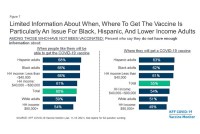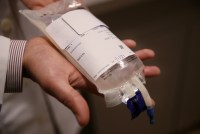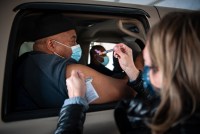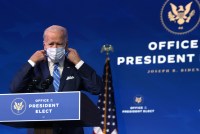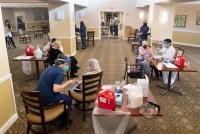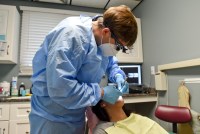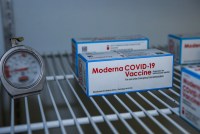Latest KFF Health News Stories
Covid Vaccine Rollout Leaves Most Older Adults Confused Where to Get Shots
Nearly 6 in 10 people 65 and older say they don’t have enough information about how to get vaccinated, according to a new KFF poll.
KHN’s ‘What the Health?’: The Biden Health Agenda
President Joe Biden is wasting no time getting to work. On his first day in office, Biden signed a series of executive orders addressing the covid pandemic, promising more to come. But even with Democrats taking the barest majority in the Senate, the new president’s ambitious proposals on covid and other health issues could be in for a rough ride. Alice Miranda Ollstein of Politico, Tami Luhby of CNN and Sarah Karlin-Smith of the Pink Sheet join KHN’s Julie Rovner to discuss these issues and more. Plus, for “extra credit,” the panelists recommend their favorite health policy stories of the week they think you should read too.
Yurts, Igloos and Pop-Up Domes: How Safe Is ‘Outside’ Restaurant Dining This Winter?
All kinds of new structures are popping up to extend the outdoor dining season. Some are safer than others.
After a Decade of Lobbying, ALS Patients Gain Faster Access to Disability Payments
In late December, then-President Donald Trump signed a law that eliminates — only for people with Lou Gehrig’s disease — the required five-month waiting period before benefits begin under the Social Security Disability Insurance program. Gaining SSDI also gives these patients immediate Medicare health coverage.
Biden Takes the Reins, Calls for a United Front Against Covid and Other Threats
On health care, President Joe Biden made it clear that combating the covid-19 pandemic will be his top priority. “We must set aside politics and finally face this pandemic as one nation,” he said. “We will get through this together.”
Advocates View Health Care as Key to Driving LGBTQ Rights Conversation
A state ban preventing local governments from enacting nondiscrimination ordinances expired Dec. 1, opening the door for a new wave of local nondiscrimination laws.
California Is Overriding Its Limits on Nurse Workloads as Covid Surges
As covid patients flood California emergency rooms, hospitals are increasingly desperate to find enough staffers to care for them all. But some nurses worry hospitals will use the pandemic as an excuse to permanently roll back their hard-won nurse-patient ratios.
Biden’s Covid Challenge: 100 Million Vaccinations in the First 100 Days. It Won’t Be Easy.
But keeping campaign promises regarding the nation’s covid response will go beyond stepping up the rollout of the vaccines.
Patients Fend for Themselves to Access Highly Touted Covid Antibody Treatments
Months after President Donald Trump credited monoclonal antibody therapy for his quick recovery from covid-19, only a trickle of the product has found its way into regular people. While hundreds of thousands of vials sit unused, sick patients who might benefit from early treatment have been left on their own to vie for access.
On Trump’s Last Full Day, Nation Records 400,000 Covid Deaths
On the day before the inauguration of a new president, the country marks a once unthinkable milestone of 400,000 deaths. The winter surge of the pandemic claimed 100,000 Americans in just five weeks.
Are Public Health Ads Worth the Price? Not if They’re All About Fear
Public service announcements about drug use or other public health problems often fall short, public health marketing experts say, because they incite people’s worst fears rather than giving people solutions.
‘An Arm and a Leg’: Host Dan Weissmann Talks Price Transparency on ‘Axios Today’
Host Dan Weissmann talked about a new federal rule — a requirement for hospitals to make public the prices they negotiate with insurers — with Niala Boodhoo for the daily-news podcast “Axios Today.”
Black Americans Are Getting Vaccinated at Lower Rates Than White Americans
Black Americans are receiving covid vaccines at a much lower rate than their white peers due to a combination of mistrust and access issues, leaving them behind in the mission to vaccinate the nation’s population.
Biden Terms Vaccine Rollout ‘A Dismal Failure’ as He Unveils Pandemic Response Plan
President-elect Joe Biden has delivered two speeches within the past 24 hours focused on his ambitious plans to address the “twin crises” of the covid-19 pandemic and its impact on the economy.
CVS and Walgreens Under Fire for Slow Pace of Vaccination in Nursing Homes
A federal program that sends retail pharmacists into nursing homes to vaccinate residents and workers has been hindered by bureaucratic hurdles and scheduling woes.
When Covid Deaths Aren’t Counted, Families Pay the Price
Inaccurate and incomplete death certificates hurt those seeking relief, recourse and closure after a loved one dies.
5 Reasons to Wear a Mask Even After You’re Vaccinated
Vaccination, face coverings and physical distancing are essential parts of a team effort against the coronavirus.
Geography Is Destiny: Dentists’ Access to Covid Shots Depends on Where They Live
A handful of states are making dentists a lower priority than other health professionals for inoculations, even though they have their hands in people’s mouths and are exposed to aerosols that spray germs in their faces.
KHN’s ‘What the Health?’: On Capitol Hill, Actions Have Consequences
Several large business groups, including health industry organizations, are cutting off contributions to Republicans who voted against the certification of Joe Biden’s election even after riots shut down the Capitol on Jan. 6. Meanwhile, the outgoing Trump administration not only approved a Medicaid block grant for Tennessee, but also made it difficult for the incoming Biden administration to undo. Joanne Kenen of Politico, Margot Sanger-Katz of The New York Times and Kimberly Leonard of Business Insider join KHN’s Julie Rovner to discuss these issues and more. Plus, Rovner interviews KHN’s Victoria Knight about the latest KHN-NPR “Bill of the Month” episode.
Delicate Covid Vaccines Slow Rollout — Leading to Shots Given Out of Turn or, Worse, Wasted
“Thaw. Rest 15 minutes. Do not shake. Do not refreeze.”Do not shake. Do not refreeze.” Moderna’s vaccine comes with complicated instructions. And both available vaccines are good for only six hours once the vial is open. So at day’s end, health workers are left to either throw out precious doses or get shots into any arm that’s available.



